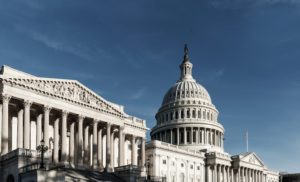
The Senate disapproves a Trump-era rule on employer discrimination complaints, President Biden signs law to combat hate crimes, and more…
IN THE NEWS
- The U.S. Senate voted 50-48 to repeal the Trump Administration’s rule requiring the U.S. Equal Employment Opportunity Commission to turn over information about discrimination complaints to employers when initiating a dispute resolution process called conciliation. The Senate voted to repeal the rule under the Congressional Review Act, which grants Congress the power to overturn agency rules filed by past administrations. Opponents of the rule, including Senator Patty Murray (D-Wash.), argued that the rule gives too much power to employers by disclosing identifying information of victims. Senate Minority Leader Mitch McConnell (R-Ky.) expressed disappointment in the resolution to overturn the rule, saying the rule “increased transparency and decreased the odds of expensive lawsuits.”
- President Joseph R. Biden signed a bill into law aimed at strengthening federal responses to hate crimes following a rise in violence against people of Asian descent during the COVID-19 pandemic. The legislation establishes a position in the U.S. Department of Justice to expedite review of hate crimes and requires the U.S. Attorney General to guide state and local law enforcement agencies on expanding online reporting. The legislation also authorizes grants for state-run reporting hotlines and law enforcement training to mitigate racism. Furthermore, the law encourages public education campaigns to raise awareness about hate crimes, particularly during the COVID-19 pandemic.
- The U.S. Supreme Court granted review of a case challenging the constitutionality of a Mississippi law that bans most abortions that take place 15 weeks after gestation, earlier than the 24-28 week period established in Roe v. Wade. The Court will hear the case in the fall. Mississippi officials have asked the Court to decide whether all pre-viability abortion restrictions are unconstitutional. Nancy Northup, president and CEO of the Center for Reproductive Rights, claimed that this question provides a foothold for a conservative-majority Court to overrule the framework created by Roe v. Wade. White House press secretary Jen Psaki affirmed President Biden’s commitment to codifying Roe v. Wade regardless of the case’s outcome.
- The Supreme Court partially reversed a decision by the U.S. Court of Appeals for the Fourth Circuit denying review of the city of Baltimore’s climate change lawsuit against major oil companies. Baltimore first sued the oil companies in a Maryland state court alleging that the companies concealed the dangerous climate impacts of fossil fuels. Justice Neil Gorsuch authored the Supreme Court’s 7-1 decision that did not reach the merits of the case, instead ruling narrowly on procedural grounds and sending the case back to the Fourth Circuit.
- The Biden Administration issued a memorandum announcing the restoration of the Department of Justice’s work focused on access to legal services. The memorandum calls for the Attorney General to submit a plan to expand the Justice Department’s access to justice work within 120 days and to “reestablish the White House Legal Aid Interagency Roundtable to prioritize civil legal aid and expand access to federal programs.” The new executive action comes amid reports that the Administration has started to review clemency applications and will seek to create a more defined system that incorporates racial justice and equity into the clemency process.
- President Biden’s Commission on the Supreme Court held its first public meeting. During the meeting, the Commission approved its bylaws and outlined the six meetings it will hold over the next 180 days. The Commission identified five priority areas of investigation, including “the genesis of the reform debate” and “the length of service and turnover of justices.” Bob Bauer, co-chair of the Commission and a professor at NYU Law School, requested that the public submit comments on these five areas of focus by August 15.
- Texas Governor Greg Abbott issued an executive order banning schools and local governments from requiring face masks. The order does, however, allow mask policies to be enforced at correctional facilities, public hospitals, and state-supported living centers for people with disabilities. Beginning May 21, local governments in violation of the order will be subject to a $1,000 fine, but schools have until June 4 to change their policies. Texas State Teachers Association president Ovidia Molina criticized the order, calling it “premature” for public schools because many children are not yet vaccinated and will be attending summer school.
- The University of California Board of Regents announced that its schools will not consider SAT or ACT scores in admissions or scholarship decisions for in-state freshman applications through fall 2024. The Board of Regents also stated that it will eliminate the standardized testing requirement entirely unless it identifies or creates another test to measure college readiness by 2025. The SAT and ACT suspension was part of a settlement with students and advocacy groups who argued that the tests disadvantage students of color, students with disabilities, and students from low-income families.
WHAT WE’RE READING THIS WEEK
- In a recent working paper, Dhaval Dave, professor at Bentley University, Joseph Sabia, professor at San Diego State University, and Samuel Safford, researcher at the Center for Health Economics & Policy Studies, analyzed the impact of a Texas state executive order issued by Governor Greg Abbott that lifted the statewide mask mandate and capacity restrictions on businesses on March 10, 2021. Dave, Sabia, and Safford found that the reopening had little impact on consumer behavior when visiting “restaurants, bars, retail establishments, entertainment venues, business services, personal care services, or grocery stores.” Dave, Sabia, and Safford’s investigation also found no evidence that Governor Abbott’s order had any impact on state-level employment in the short-run, nor did it cause an increase in growth of COVID-19 cases.
- In a forthcoming article in the Michigan Law Review, professors Quinn Curtis of the University of Virginia School of Law, Jill E. Fisch of the University of Pennsylvania Law School, and Adriana Robertson of the University of Toronto Faculty of Law argued that mutual funds prioritizing environmental, social, and corporate governance (ESG) criteria have grown rapidly as investors look to grow their assets in a socially-conscious way. Curtis, Fisch, and Robinson explained that some regulators fear that the use of ESG labels could be exploitative to ordinary investors if funds are not actually managed with ESG goals in mind. Curtis, Fisch, and Robertson concluded, however, that these funds do offer increased exposure in alignment with ESG investing principles, indicating investors are indeed receiving the financial products they expect.
- In a report for the Center for American Progress, Elise Gout, Jamil Modaffari, and Kevin DeGood argued that the U.S. Congress must prioritize climate resilience and energy efficiency in school infrastructure improvement plans as districts prioritize current spending to comply with COVID-19 protocols. Gout, Modaffari, and DeGood recommended using American Rescue Plan funding to install zero-emission upgrades, such as solar panels and electric bus fleets, to generate immediate and long-term benefits for children. They argued that this federal investment is a necessary supplement to local funding, since majority nonwhite districts receive $23 billion less in funding each year than majority white districts. Gout, Modaffari, and DeGood suggested that successful zero-emission approaches in schools could serve as a model for deploying similar solutions in commercial buildings.
FLASHBACK FRIDAY
- In an essay in The Regulatory Review, Alexandra B. Klass, professor at the University of Minnesota Law School, argued that widening gaps between federal and state energy policies would lead to conflicts requiring judicial intervention. Klass explained that when Congress is stifled by partisanship, it is unlikely to expand federal authority because of concerns over states’ rights. Instead, Klass posited that disputes involving inconsistencies between federal and state policies would be resolved in federal courts under the Supremacy Clause of the U.S. Constitution. Klass warned that courts would be busy resolving conflicts between emerging state policies that promote clean energy and federal policies that preference fossil fuel infrastructure.



